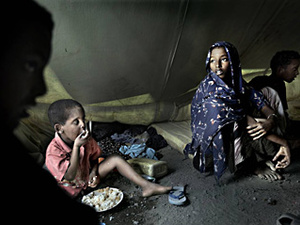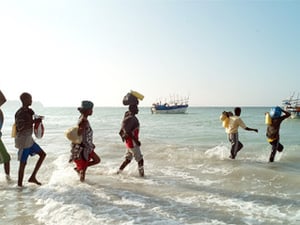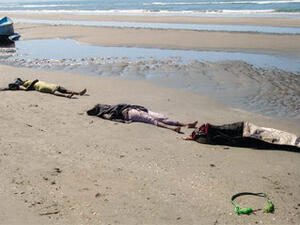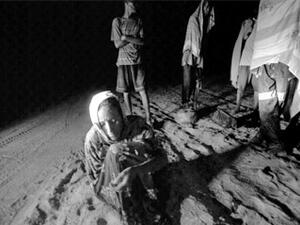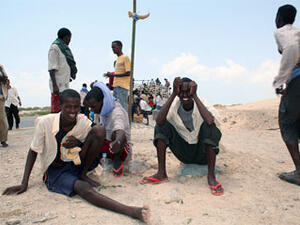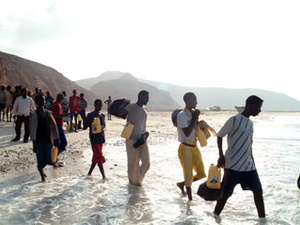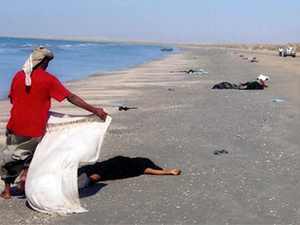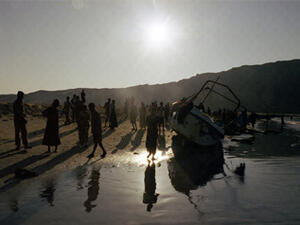Sharks, beatings fail to stem tide of arrivals in Yemen
Sharks, beatings fail to stem tide of arrivals in Yemen

After a traumatising journey with smugglers across the Gulf of Aden, Somalis, Ethiopians and Sudanese arrive on the beaches of Yemen. In recent weeks, at least 64 people have died making the voyage.
BOSSASO, Somalia, October 20 (UNHCR) - The UN refugee agency has started screening Ethiopians held in Somalia en route to Yemen. This comes amid reports of an incident where a few of those making the perilous voyage across the Gulf of Aden were beaten by smugglers and thrown to the sharks.
According to UNHCR staff in Yemen, more than 5,700 people have arrived in 56 boats from Somalia since the start of improved sailing weather in early September. Passengers and Yemeni authorities say that 64 people have died making the voyage across the Gulf of Aden, while 62 people are still missing.
Among the recent arrivals were eight boats carrying a total of 853 Somalis and Ethiopians to Jilaa in southern Yemen's Shabwa governorate on October 13-14.
"Passengers on one boat reported that five Ethiopians were beaten by the smugglers, thrown overboard and attacked by sharks in view of the others on the vessel," UNHCR spokesman Ron Redmond told journalists in Geneva on Friday. "Upon arrival on the Yemen coast, the smugglers forced 25 Ethiopians to remain onboard one of the boats because it had developed engine trouble and their weight was required to maintain balance for the return voyage to Somalia. They have not been seen since."
Ekber Menemencioglu, UNHCR's Geneva-based director for the region, bemoaned the tragedy: "What is happening in the Gulf of Aden is tantamount to murder at sea. Unlike Europe - where migration is the topic of the day - the Gulf of Aden seems to be off the radar. It is a sheer tragedy that not more is being done by the international community and local governments to turn the tide and prevent more people from dying or leaving their homes in despair."
Since early September, a total of 3,314 Somali, 200 Ethiopian and two Sudanese arrivals have been transported to UNHCR's May'fa reception centre near Bir'Ali in southern Yemen, where they were given medical care, food and assistance from the refugee agency and its partners.
The tide of people crossing the Gulf of Aden continues despite the dangerous journey on smugglers' boats and a recent crackdown against human smuggling in some parts of north-eastern Somalia's Puntland region. About 10 days ago, there were reports that some 1,300 Ethiopian migrants had been returned from Puntland to the border town of Gallali, in south-eastern Ethiopia.
Earlier this week, the local authorities in Puntland agreed to let UNHCR properly identify potential asylum seekers among Ethiopians who had recently arrived.
The refugee agency began interviewing and counselling these Ethiopians on Thursday.
"Our six-member team in Bossaso has started to conduct interviews with a group of some 600 Ethiopians who are being held at a mosque in Bossaso by the Puntland authorities," said Redmond. "There are an estimated 50 unaccompanied children among them. We are sending a specialist to Bossaso determine their needs and status."
The authorities estimate there are at least another 3,000 Ethiopians currently in Puntland, whom UNHCR will also screen.
Redmond added that the Puntland authorities had allocated UNHCR a piece of land to set up a transit facility for screening, and that other international and local non-governmental organizations have offered to help, including with transportation for the return of the Ethiopians.


